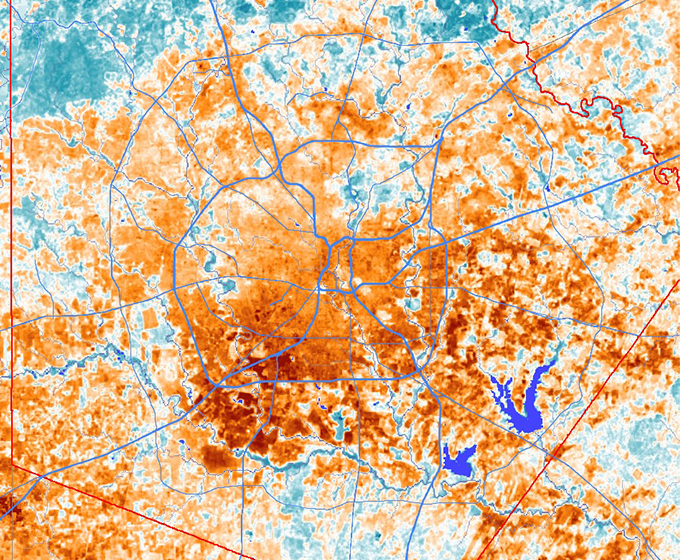
This heat map shows the difference in temperatures across San Antonio. The dark orange represents the hottest areas and dark blue represents the coolest.
SEPTEMBER 25, 2023 — Southwest Research Institute and UTSA are collaborating to study the “felt heat” of San Antonio’s historic West Side. The prevalence of paved surfaces creates an environment that feels considerably hotter than the rest of the city.
The work, led by Principal Scientist Stuart Stothoff of SwRI’s Chemistry and Chemical Engineering Division and Esteban Lopez Ochoa of the Margie and Bill Klesse College of Engineering and Integrated Design at UTSA, is supported by a $125,000 grant from the Connecting through Research Partnerships (Connect) Program.
“If you look back in time, the West Side has always been somewhat neglected,” Lopez Ochoa said. “The consideration was not there to keep green spaces, which are cooler and offer more shade than pavement, which absorbs heat. It’s just easier to pave. When you compare different areas of the city, that area does lack vegetation much more than other areas of San Antonio.”
As a result of the greater amount of paved surfaces on the West Side, people there experience considerably more heat than in the rest of the city. Recent measurements by Lopez Ochoa showed temperatures as high as 154 degrees Fahrenheit just above the pavement.
“We’re working to precisely characterize what’s going on in this unusually hot area of the city, so that eventually a solution can be found to alleviate it,” Stothoff said.
Over the next year, SwRI and UTSA will place sensors in representative locations around the West Side to measure the felt heat in various environments. The sensors will gather data on air flow, wind speeds, relative humidity, air temperatures and dew points.
“The publicly available information about the heat measured on the West Side is satellite data, derived from visible or infrared wavelengths. It’s useful, but it doesn’t characterize the actual felt heat,” Stothoff said. “Satellite data also doesn’t allow you to see underneath the trees, in the shade. By placing our sensors in various key locations, we can measure the temperatures people actually feel.”
Stothoff and Lopez are also considering putting sensors inside homes on the West Side and are working with the Historic Westside Neighborhood Association and the Esperanza Peace and Justice Center to connect with residents who might be willing to participate.
Once the data gathering is complete, SwRI will create an energy balance model to comprehensively evaluate the felt environment and adapt publicly available weather data to better represent ambient temperatures and overall thermal comfort on the West Side.
SwRI’s Executive Office and the UTSA Office of the Vice President for Research, Economic Development, and Knowledge Enterprise sponsor the Connect program, which offers grant opportunities to enhance greater scientific collaboration between the two institutions.
UTSA Today is produced by University Communications and Marketing, the official news source of The University of Texas at San Antonio. Send your feedback to news@utsa.edu. Keep up-to-date on UTSA news by visiting UTSA Today. Connect with UTSA online at Facebook, Twitter, Youtube and Instagram.
Move In To COLFA is strongly recommended for new students in COLFA. It gives you the chance to learn about the Student Success Center, campus resources and meet new friends!
Academic Classroom: Lecture Hall (MH 2.01.10,) McKinney Humanities BldgWe invite you to join us for Birds Up! Downtown, an exciting welcome back event designed to connect students with the different departments at the Downtown Campus. Students will have the opportunity to learn about some of the departments on campus, gain access to different resources, and collect some giveaways!
Bill Miller PlazaCome and celebrate this year's homecoming at the Downtown Campus with food, games, giveaways, music, and more. We look forward to seeing your Roadrunner Spirit!
Bill Miller PlazaThe University of Texas at San Antonio is dedicated to the advancement of knowledge through research and discovery, teaching and learning, community engagement and public service. As an institution of access and excellence, UTSA embraces multicultural traditions and serves as a center for intellectual and creative resources as well as a catalyst for socioeconomic development and the commercialization of intellectual property - for Texas, the nation and the world.
To be a premier public research university, providing access to educational excellence and preparing citizen leaders for the global environment.
We encourage an environment of dialogue and discovery, where integrity, excellence, respect, collaboration and innovation are fostered.